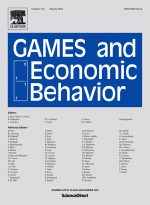
Luisa Herbst, Kai A. Konrad, Florian Morath, 2017,
Games and Economic Behavior, 103, 168-184
Games and Economic Behavior, 103, 168-184
Abstract:
We study the role of an imbalance in fighting strengths when players bargain in the shadow of conflict. Our experimental results suggest: In a simple bargaining game with an exogenous mediation proposal, the likelihood of conflict is independent of the balance of power. If bargaining involves endogenous demand choices, however, the likelihood of conflict is higher if power is more imbalanced. Even though endogenous bargaining outcomes reflect the players’ unequal fighting strengths, strategic uncertainty causes outcomes to be most efficient when power is balanced. In turn, the importance of exogenous mediation proposals depends on the balance of power.
We study the role of an imbalance in fighting strengths when players bargain in the shadow of conflict. Our experimental results suggest: In a simple bargaining game with an exogenous mediation proposal, the likelihood of conflict is independent of the balance of power. If bargaining involves endogenous demand choices, however, the likelihood of conflict is higher if power is more imbalanced. Even though endogenous bargaining outcomes reflect the players’ unequal fighting strengths, strategic uncertainty causes outcomes to be most efficient when power is balanced. In turn, the importance of exogenous mediation proposals depends on the balance of power.

